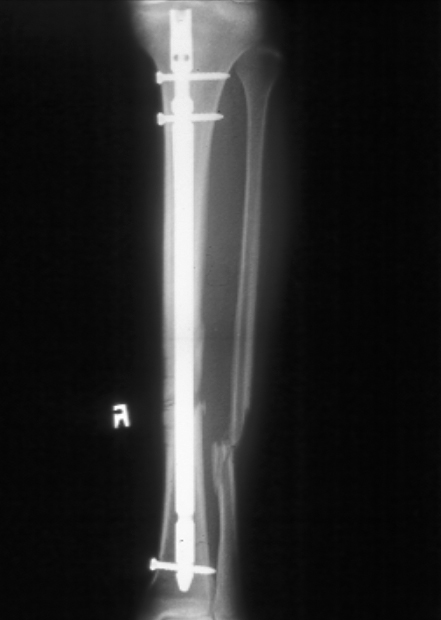Our reading for conference this week was 125+ pages of bone biology...
An Orthopedic residency blog, about the (mis)adventures of orthopedic residency at an academic hospital.
Tuesday, January 28, 2014
Tuesday, January 21, 2014
Saturday, January 18, 2014
I think this is the first post that requires speakers...
We were doing a spinal hardware revision and we got the rod out (see labels 'heehee'), but didn't have the right screwdriver to get the screws out. My attending turned around and was at the back table, I thought what the hey, and reached in and unscrewed 4 pedicle screws with my gloved hands.
Attending: 'You got them out?! Woah, strong work'
What I did:
What I was doing inside my head:
We were doing a spinal hardware revision and we got the rod out (see labels 'heehee'), but didn't have the right screwdriver to get the screws out. My attending turned around and was at the back table, I thought what the hey, and reached in and unscrewed 4 pedicle screws with my gloved hands.
Attending: 'You got them out?! Woah, strong work'
What I did:
What I was doing inside my head:
Friday, January 17, 2014
Wednesday, January 15, 2014

Dr. Rives steadying his hand for a delicate CPT entry procedure.
Hand Surgeon undergoes extensive pre-operative planning on how to bill the next case
REDLANDS, CA - Local area upper extremity surgeon Dr. Bill Rives underwent extensive hours of preparation and literature review for his next cases billing. When asked about the case, Dr. Rives replied 'it's really one of my most complex cases to date as far as coding goes. It's going to really need every trick I've learned. Just think of the damage you could do to the patients neuroplasty coding if you didn't at least add neurolysis. It'd be disastrous." He then added: "But I'm not worried about the case. I didn't complete an extremely prestigious hand fellowship for nothing."
Dr. Rives is nationally known for his hand surgery coding abilities. "It's really amazing to watch," 4th year resident Lee Resnik stated. "The way he dissects CPT codes, or how he can elevate the RVU's without touching the delicate underlying ICD-9 relationships... wow. Most humans aren't born with such innate unbundling ability." Dr. Rives was last seen deep in thought mumbling something about how carpal tunnel syndrome is kind of, basically, sort of, a compartment syndrome that needed fasciotomy.
Dr. Rives is nationally known for his hand surgery coding abilities. "It's really amazing to watch," 4th year resident Lee Resnik stated. "The way he dissects CPT codes, or how he can elevate the RVU's without touching the delicate underlying ICD-9 relationships... wow. Most humans aren't born with such innate unbundling ability." Dr. Rives was last seen deep in thought mumbling something about how carpal tunnel syndrome is kind of, basically, sort of, a compartment syndrome that needed fasciotomy.
Tuesday, January 14, 2014
New orthopaedic reimbursement ties compensation to number of times ‘that’s what she said.’
Inland Empire, CA – In addition to the new ICD-10 coding
that will soon be transforming medical coding, Orthopedic RVU’s will now be
based on a cases average ‘that’s what she saids’ or TWSS’s. According to a recent American Association of
Orthopedic Surgeon (AAOS) press release, the move came after months of private
negotiations between surgeon groups, with the AAOS finally entered in the
backdoor discussions last week, prompting today’s announcement. Steve Remi, an AAOS representative offered a statement:
“Heehee…entered in the backdoor…”
Michael Reiswig, one of the surgeons responsible for the
historic change gave his take: “It really was pretty intuitive. Carpal tunnel releases were averaging 30
minutes per case, and like 0.7 TWSS’s. I mean, what can you say during a carpal tunnel release, 'looking
forward to doing some hand work'? On the other hand, tibial nailings were around
90 minutes and 4.3 TWSS’s per case. ‘This
rod’s too big.’ ‘It won’t fit in the canal.’ ‘Just pound on it a little harder.’
It only made sense that higher compensation should be linked to the cases with
more double entendres.”
The orthopedic oncologists were the one sub-specialty
opposed to the move, stating simply that they were 'getting screwed’.
Sunday, January 12, 2014
OR conversations:
(conversation about a paleo diet)RN: "I basically don't eat anything with ingredients I can't pronounce. Like bananas."
Me: "Do you know how many complex sugars and compounds there are in bananas which we both can't pronounce?"
RN: "But I can pronounce banana."
Me: "And I can pronounce cheesypoof."
Saturday, January 11, 2014

Dr. Simes demonstrating the proper technique of leaving the elbow free of webril during prophylactic splinting.
Junior orthopedic resident covers mistake by coining the phrase "prophylactic splinting"
RIVERSIDE, CA - Quick thinking second year junior orthopedic resident Mark Simes attempted to cover a mistake by convincing an attending of the utility of prophylactic splinting. At sign out, Dr. Simes presented the case of 38 year old Blake Sampson who presented acutely intoxicated to the ED with a left both bone forearm fracture. Dr. Simes then presented post reduction films of a splinted and seemingly uninjured right forearm.
When questioned about the apparent mistake, the rapidly adapting Dr. Simes stated: "We knew the left forearm was fractured, that much was clear. Would it displace? Was it stable? I wanted to evaluate the full nature of injury, which I felt needed to be stressed under physiologic conditions to do so." When questioned about why a splint was placed on the uninjured arm, Simes stated: "In his state of intoxication, who knew what was going to happen to the right arm. I wasn't so much concerned with the fracture that was, I was concerned about the fracture that might be." The attending gave a long sigh and was heard mumbling something about "needing to get to private practice" while the OR control desk called for the patient for his prophylactic forearm ORIF.
Subscribe to:
Posts (Atom)








